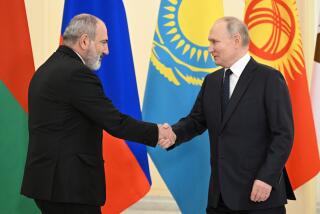Armenian Hard-Liners Consolidate Control
- Share via
MOSCOW — Armenian politicians opposed to compromise to settle a 10-year-old territorial dispute with neighboring Azerbaijan consolidated their hold on power Wednesday by forcing out the last of the country’s moderate leaders.
A day after President Levon Ter-Petrosyan resigned in the face of the strengthening nationalist forces, Babken Ararktsyan, the parliamentary speaker named to replace him, also was compelled to step down.
Prime Minister Robert Kocharyan, former leader of the rebellious Nagorno-Karabakh territory and the primary force behind the current leadership disruptions, has assumed the presidency of the tiny Caucasus country of 3.6 million.
Elections for a new president have been set for March 16, but Kocharyan is not expected to be a candidate because he fails to meet citizenship requirements as outlined in Armenia’s Constitution.
Kocharyan lived in his native Karabakh, which has long been under the titular governance of Azerbaijan, until moving to Yerevan, the Armenian capital, a year ago to become Ter-Petrosyan’s sixth Cabinet chief.
Public reaction to the power struggle was said to be muted, and no immediate demonstrations for or against the new leadership were reported.
“The situation is very tranquil here,” Araik Manukyan, acting director of the Armenpress news agency, said by telephone from Yerevan. “There’s nothing to indicate the president has resigned and an under-the-carpet fight for power is in full swing.”
But if the dormant Karabakh dispute that precipitated Ter-Petrosyan’s departure rekindles to consume struggling Armenia’s limited military and economic resources, popular discontent with a new outbreak of warfare in the disputed enclave could be expected.
Thousands died in six years of ethnic fighting in Karabakh, and at least 500,000 Azerbaijanis were expelled from the enclave and from territory surrounding it that was seized by Karabakh Armenians backed by Yerevan.
A 1994 cease-fire brokered by the Organization for Security and Cooperation in Europe, or OSCE, froze the tense status quo in the disputed region. But a permanent settlement has proved elusive because Karabakh Armenians refuse to accept any political status within Azerbaijan.
Ter-Petrosyan ran afoul of Kocharyan and powerful Defense Minister Vazgen Sarkisyan when he reluctantly agreed in September to accept OSCE proposals that Azerbaijani refugees be allowed to return to their homes in the Armenian-occupied areas surrounding Karabakh and that the enclave itself accept broad autonomy instead of independence from Azerbaijan.
Now, Kocharyan made it clear that Armenia will take a tougher stand in Karabakh peace talks. “The Armenian army today is much stronger than the Azerbaijanis,” he told journalists in Yerevan. “Nobody wants peace more than we do, but I believe that being prepared for war is the best way to secure peace.”
Azerbaijani President Heydar A. Aliyev summoned his national security council to an emergency meeting to discuss the crisis in rival Armenia. Aliyev said he hoped that Armenia’s internal difficulties would end soon and that “the process of a peaceful settlement of the Armenian-Azerbaijani conflict will continue on the basis of the OSCE principles.”
Russian President Boris N. Yeltsin expressed regret at the resignation of Ter-Petrosyan and worried aloud that “tough new people will probably come now” to the leadership of Armenia. But Yeltsin observed that it remains in the interests of the Caucasus state to retain good relations with its Russian neighbor.
More to Read
Sign up for Essential California
The most important California stories and recommendations in your inbox every morning.
You may occasionally receive promotional content from the Los Angeles Times.














